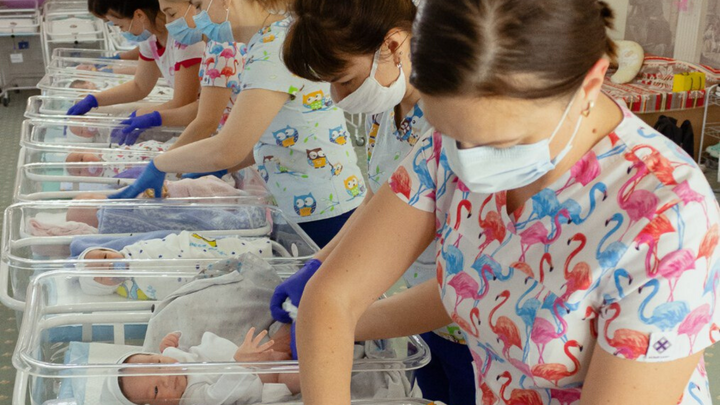Ukrainian Surrogacy Clinic Advertises Babies for Black Friday
Surrogacy industry in Ukraine specifically targets poor women from small villages.

Ukrainian fertility clinic, BioTexCom Center for Human Reproduction, received sharp criticism from netizens for an advertisement posted to Twitter featuring a woman surrounded by babies with the text: “SALE: Black Friday.” The clinic wrote: “Hurry up and receive a discount. A unique proposal for our clients – 3 percent OFF EVERY PACKAGE.”
In May 2020, photographs from the Kyiv-based surrogacy clinic made global headlines when over 100 babies were left stranded after Ukraine closed its borders to foreign travelers in order to prevent the spread of Covid-19.
Commercial surrogacy, where a woman is paid a fee for giving birth, is legal in only a few countries in the world, and almost all of them in the former Soviet Union: Belarus, Georgia, Kazakhstan, Russia, Ukraine, in addition to several US states. Commercial surrogacy Ukraine is unregulated, and two-thirds of the industry operates illegally, according to Sergii Antonov, a Kyiv-based lawyer specializing in the reproductive field.
Ukraine is by far the most popular nation for the practice of “reproductive tourism,” and attracts an international market of buyers of babies. The firm offers customer service in English, Chinese, French, German, Hebrew, Italian, Korean and Romanian, amongst other languages.
The highly profitable surrogacy industry in Ukraine specifically targets poor women from small villages. BioTexCom’s owner, Albert Tochilovsky, said in a November 2019 interview published on the company website, that commercial surrogacy is a “highly paid job” for “women from small villages without husbands.”
“The clinic also offers the option of sex selection, allowing buyers to choose the sex of the infant they purchase.”
BioTexCom is also one of a few fertility clinics worldwide that is commercializing an untested and highly controversial method of genetic engineering that it markets as “mitochondrial donation.” This involves interfering with mitochondrial DNA of an egg to force an embryo to carry the genetic material of two women and one man, resulting in what is advertised as “three-parent” babies.
Mitochondrial replacement results in a germline change, but that change is passed to future generations only if the child is a girl. This has implications for human genetic modification of the female sex. According to a 2016 article published by The Conversation, the U.S. National Academies of Science advised that use of mitochondrial editing be limited to male embryos, in which event the change would not be inheritable. So far, this suggestion has been ignored by policymakers.
The clinic also offers the option of sex selection, allowing buyers to choose the sex of the infant they purchase. The technology which resulted in embryonic sex selection was championed as beneficial for the agriculture industry and is already being applied to the dairy and egg industries to select for female livestock. Experts have raised concerns that sperm-sorting sex selective methods could result in fewer girls being born. The technique involves deliberately slowing X spermatozoa, which carry 2.8% more genetic material (DNA) than Y spermatozoa, to allow for unburdened male-coded sperm to pass by.
“In countries where there is already a skewed sex ratio, it is clear that if there are more easy, cheap, accessible technologies they will be used,” bioethicist Wybo Dondorp of Maastricht University in the Netherlands cautioned. In 2020 a UN report highlighted how “son preference” and sex selection resulted in an estimated 460,000 girls, “missing” at birth in India each year between 2013-17, which translates to an average of 1,260 girls “missing” each day.

Last year Mykola Kuleba, Ukraine’s Presidential Commissioner for Children’s Rights, recommended banning surrogacy, arguing that, “commercialisation and permission to receive such a ‘service’ in Ukraine promotes the uncontrolled sale of Ukrainian children abroad.”
“The birth of a child far from the mother is unnatural. In this way, Ukraine simply becomes an international online store for babies. And we don’t know the real number of such children that Ukraine ‘supplies’ in this way,” he added.
Assisted reproductive technologies (ART) and fertility clinics owe much of their success to animal experimentation carried out in the livestock industries and to Robert G. Edwards, inventor of in vitro fertilization (IVF). Edwards claimed to be motivated by a desire to help infertile women, but was a member of the Eugenics Society in Britain for much of his career and served on the organization’s Council.
There is anecdotal evidence from women who have been involved in the ART industry that the potent drugs used in the process can lead to various cancers of the reproductive system, though research in this area is sorely lacking and on the whole, governments are not requiring clinics to conduct long-term follow-up research.
Tetiana Shulzhynska, a Ukrainian woman who underwent a surrogacy procedure in 2013 because she desperately needed to pay back a bank loan, attempts to warn other women. Shulzhynska contracted cervical cancer just months after giving birth. In 2020 she told The Guardian, “In a contract, they protect only babies, they don’t care about us.”
Moreover, Dutch researchers who analyzed the health records of more than a million children conceived through assisted reproduction involving frozen embryo transfer found they were more than twice as likely to develop childhood cancer. In addition, a study by the University of Cambridge found that children born via surrogacy are more likely to suffer from depression.
4W provides paid writing work for over 50 women in countries spanning the globe. This work is made possible thanks to our paid monthly subscribers. Join today to support our work!
Enter your email below to sign in or become a 4W member and join the conversation.
(Already did this? Try refreshing the page!)




Comments